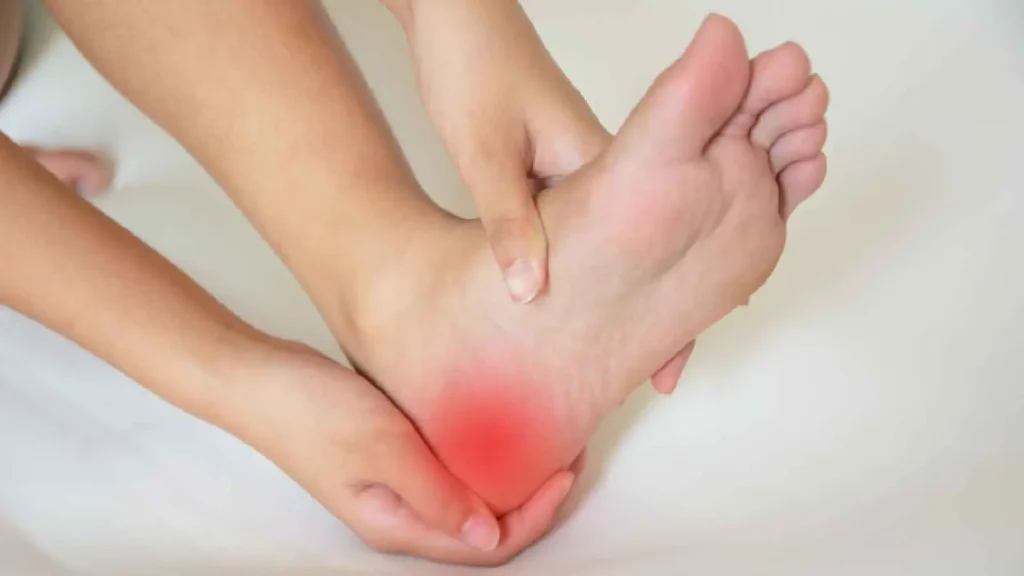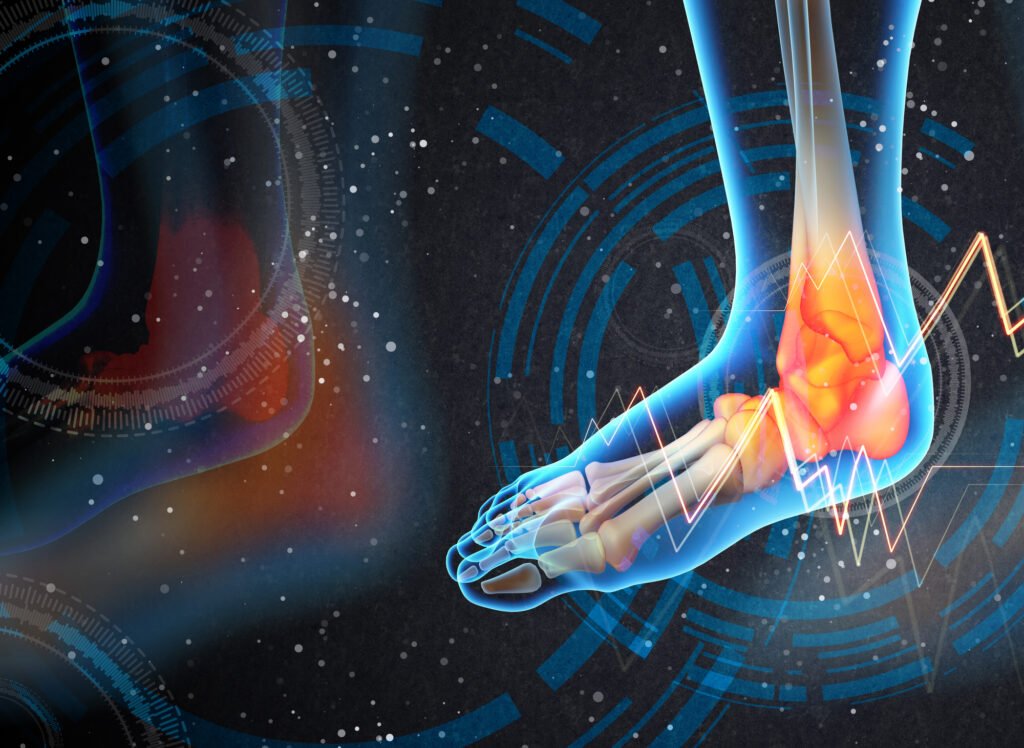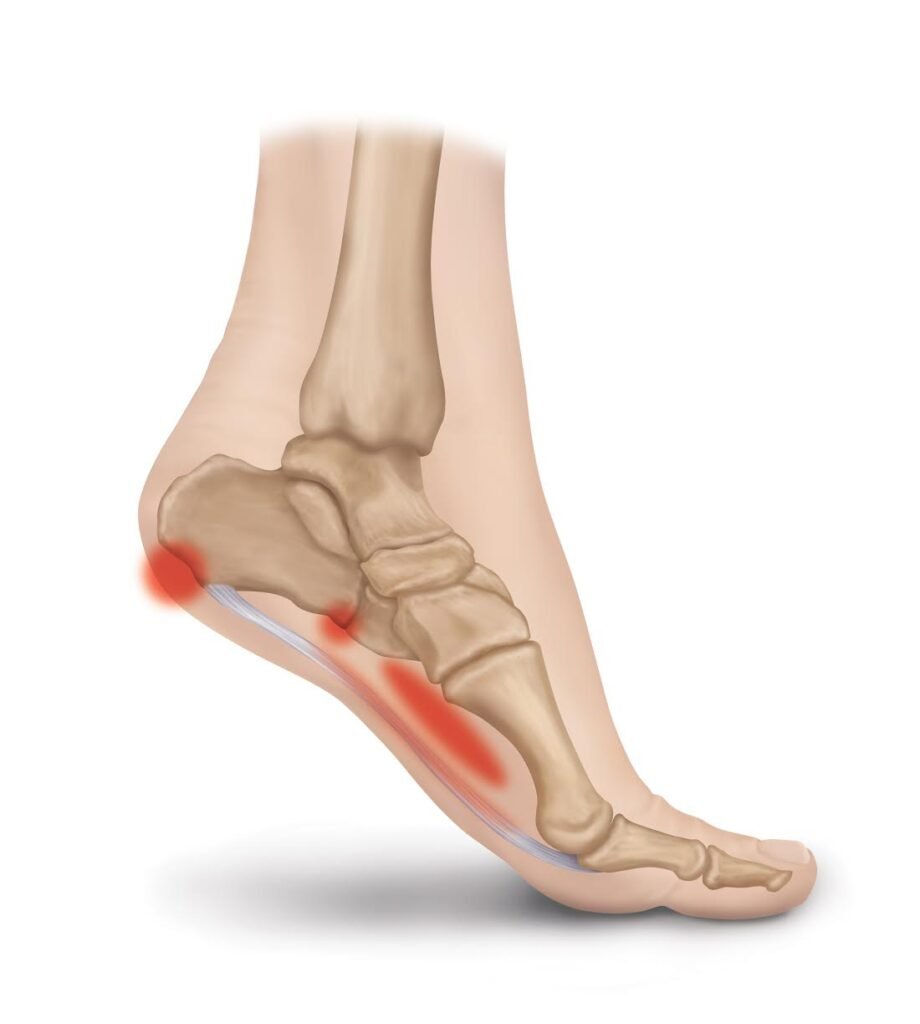Heel pain cancer can be a surprising and frustrating problem for those already dealing with a tough diagnosis. While cancer treatments focus on beating the disease, heel pain can suddenly make everyday activities harder.
Understanding why heel pain happens during cancer treatments and knowing how to ease the pain can help make life a little easier. Let’s explore why heel pain cancer is a real issue and what you can do to feel better.
What is Heel Pain Cancer?
Heel pain cancer can be a surprising problem for people already fighting cancer. Cancer treatments are tough, and adding heel pain makes it even harder. Understanding why heel pain happens during cancer treatments can help you feel better.
Heel pain can come from different causes, like Plantar Fasciitis. This happens when the arch of your foot gets weak and can’t support your weight. Cancer treatments can make your bones and muscles weak, leading to this problem.
Knowing how cancer treatments affect your feet is important. Treatments like chemotherapy and radiation can cause bone loss and muscle weakness. This makes your feet more likely to get hurt and feel pain.
How Cancer Treatments Cause Heel Pain
Cancer treatments can cause heel pain in different ways. Chemotherapy, radiation, and some medications can weaken your bones and muscles. This makes your feet more likely to hurt.
Weaker bones and muscles can lead to Plantar Fasciitis. This is when the arch of your foot gets weak and can’t support your weight. When your arch is weak, it can cause small tears and stress, leading to pain.
Weight changes during cancer treatments can also cause heel pain. Some treatments make you gain weight quickly, putting more stress on your feet. Other treatments make you lose weight, which can also affect your feet.

Common Heel Pain Problems During Cancer
Heel pain cancer can lead to different problems. One common issue is Plantar Fasciitis. This happens when the arch of your foot gets weak and can’t support your weight. It can cause sharp pain in your heel.
Another problem is muscle wasting. Cancer treatments can make your muscles weak, affecting your feet. Weak muscles can’t support your body properly, leading to heel pain.
Bone loss is also a concern during cancer treatments. Weaker bones are more likely to get injured, causing pain. It’s important to take care of your feet during cancer treatments to avoid these problems.
Why Chemotherapy Causes Heel Pain
Chemotherapy can cause heel pain cancer. This treatment is strong and can weaken your bones and muscles. Weaker bones and muscles make your feet more likely to hurt.
Chemotherapy can also cause weight changes. Some people gain weight quickly, putting extra stress on their feet. Others lose weight, which can also affect their feet.
Taking care of your feet during chemotherapy is important. Using orthotics, stretching, and icing can help relieve heel pain. It’s also important to talk to your doctor if you have severe pain.
Radiation Therapy and Heel Pain: What to Know
Radiation therapy can lead to heel pain cancer. This treatment can weaken your bones and muscles, making your feet more likely to hurt. Weaker bones can lead to Plantar Fasciitis and other foot problems.
Radiation therapy can also cause weight changes. Gaining or losing weight quickly puts extra stress on your feet. It’s important to watch for signs of heel pain during radiation therapy.
Talking to your doctor about heel pain is important. They can help you find ways to relieve pain and take care of your feet. Simple treatments like orthotics and stretching can make a big difference.
Medications and Heel Pain Cancer Connection
Some medications for cancer can cause heel pain. These medications can weaken your bones and muscles, making your feet more likely to hurt. Heel pain cancer can be a side effect of these treatments.
Weight changes from medications can also cause heel pain. Gaining weight quickly puts extra stress on your feet. Losing weight can also affect your feet and cause pain.
Taking care of your feet while on medications is important. Using orthotics, stretching, and icing can help relieve pain. Talking to your doctor about heel pain can help you find the best treatments.
How to Recognize Heel Pain from Cancer Treatments
Recognizing heel pain cancer is important. Heel pain can come from different causes, like Plantar Fasciitis. Knowing the signs can help you find the right treatments.
Pain in your heel when you walk or stand is a common sign. This pain can be sharp or dull and can make it hard to move. If you have heel pain, it’s important to pay attention to when it happens.
Noticing changes in your feet can also help. If you see swelling, lumps, or redness, talk to your doctor. They can help you figure out if your heel pain is related to cancer treatments.
Easy Home Remedies for Heel Pain Cancer
Home remedies can help with heel pain cancer. Using simple treatments can make a big difference. Orthotics, stretching, and icing are great ways to relieve pain.
Orthotic inserts support your feet and help with pain. These inserts lift your arch and provide cushioning. Using orthotics can help your feet feel better.
Stretching your feet can also help. Gentle stretches for your heels, toes, and calves can improve flexibility. Stretching can be done from bed and only takes a few minutes.
Best Stretches to Relieve Heel Pain During Cancer
Stretching can help relieve heel pain cancer. Gentle stretches for your feet and legs can make a big difference. Stretching improves flexibility and reduces pain.
Start with simple toe stretches. Sit on your bed and gently pull your toes back. Hold for a few seconds and repeat. This stretch can help with heel pain.
Calf stretches are also important. Stand facing a wall and place your hands on it. Step one foot back and press your heel into the ground. Hold for a few seconds and switch feet.
Using Orthotic Inserts for Heel Pain Relief
Orthotic inserts can help with heel pain cancer. These inserts provide support and cushioning for your feet. Using orthotics can make walking and standing more comfortable.
Orthotics lift your arch and reduce stress on your feet. They can be used in any type of shoe. Choosing the right orthotic insert is important for the best results.
Cleaning and maintaining your orthotics is also important. Wash them regularly and check for wear and tear. Proper care can help your orthotics last longer and work better.
Night Splints: A Solution for Heel Pain Cancer
Night splints can help with heel pain cancer. These devices keep your foot in a gentle stretch while you sleep. Using night splints can reduce pain in the morning.
Night splints are easy to use. Simply wear them to bed and let them do the work. They help keep your foot in a good position all night long.
Comfort is important when choosing a night splint. Look for a soft and adjustable option. This will help you sleep better and reduce heel pain.
The Benefits of Icing for Heel Pain During Cancer
Icing can help with heel pain cancer. Using ice packs reduces swelling and pain. Icing is a simple and effective home remedy.
Apply an ice pack to your heel for 10-20 minutes. Do this several times a day for the best results. Make sure to wrap the ice pack in a towel to protect your skin.
Self-massage can also help. Gently massage your heel with your fingers or a small ball. This can improve blood flow and reduce pain.

How Self-Massage Can Help Heel Pain Cancer
Self-massage is a great way to relieve heel pain cancer. Gently massaging your feet can reduce pain and improve blood flow. This simple treatment can be done at home.
Use your fingers to massage your heel and arch. Apply gentle pressure and move in circular motions. Spend a few minutes on each foot for the best results.
Household items like a small ball can also be used. Roll the ball under your foot to massage your heel. This can help reduce pain and improve flexibility.
When to See a Doctor for Heel Pain Cancer
Seeing a doctor for heel pain cancer is important. If home remedies don’t help, it’s time to get professional advice. Your doctor can help find the best treatments for your pain.
Unusual symptoms should also be checked by a doctor. If you notice lumps, swelling, or redness, make an appointment. These signs can be related to cancer treatments.
Severe pain that doesn’t go away is another reason to see a doctor. They can help find the cause of your heel pain and suggest the right treatments.
Can Heel Pain Be a Sign of Cancer?
Heel pain can sometimes be a sign of cancer, but it’s rare. Most heel pain is caused by other problems like Plantar Fasciitis. Knowing the signs can help you understand your pain.
Cancer can cause heel pain if it spreads to the bones. This is rare but possible. Unusual lumps or bumps on your feet should be checked by a doctor.
Other symptoms like fatigue, fever, or weight loss can also be signs of cancer. If you have these symptoms along with heel pain, talk to your doctor. They can help find the cause.
Non-Cancerous Causes of Heel Pain
Many non-cancerous causes can lead to heel pain. Plantar Fasciitis is a common problem. It happens when the arch of your foot gets weak and causes pain.
Achilles tendinitis is another cause. This happens when the tendon at the back of your heel gets injured. It can cause pain and swelling.
Bone spurs can also cause heel pain. These are small bone growths that develop on your heel. They can make it painful to walk or stand.
Heel Pain Cancer: Myths and Facts
There are many myths about heel pain cancer. One myth is that all heel pain is caused by cancer. Most heel pain is from other problems like Plantar Fasciitis.
Another myth is that heel pain always means something serious. Many cases of heel pain are easy to treat with home remedies. Orthotics, stretching, and icing can help.
Understanding the facts about heel pain is important. Knowing the real causes can help you find the right treatments. Talk to your doctor if you have concerns.
Tips to Prevent Heel Pain During Cancer Treatments
Preventing heel pain cancer is possible. Taking care of your feet during cancer treatments is important. Simple steps can make a big difference.
Wearing supportive shoes is one way to prevent pain. Choose shoes with good arch support and cushioning. Avoid high heels and shoes that don’t fit well.
Staying active can also help. Gentle exercises like walking or swimming keep your feet strong. Stretching your feet and legs can improve flexibility and reduce pain.
Healthy Weight and Its Impact on Heel Pain Cancer
Maintaining a healthy weight is important for preventing heel pain cancer. Extra weight puts more stress on your feet. This can lead to problems like Plantar Fasciitis.
Losing weight can also affect your feet. Rapid weight loss can make your muscles weak. It’s important to find a balance and keep your feet strong.
Eating a balanced diet can help maintain a healthy weight. Include plenty of fruits, vegetables, and lean proteins. Staying hydrated is also important for overall health.
The Role of Exercise in Managing Heel Pain Cancer
Exercise can help manage heel pain cancer. Gentle exercises keep your feet and legs strong. This can reduce pain and improve flexibility.
Walking is a great exercise for your feet. It’s low-impact and easy to do. Swimming is another good option. The water supports your body and reduces stress on your feet.
Stretching is also important. Simple stretches for your heels, toes, and calves can help. Spending a few minutes each day stretching can make a big difference.
The Importance of Proper Footwear for Heel Pain
Wearing proper footwear is important for preventing heel pain cancer. Supportive shoes can reduce stress on your feet. This can help prevent problems like Plantar Fasciitis.
Look for shoes with good arch support and cushioning. Avoid high heels and shoes that don’t fit well. Orthotic inserts can provide extra support and comfort.
Taking care of your shoes is also important. Replace them when they get worn out. Wearing old or damaged shoes can cause more pain and problems.
Heel Pain Cancer: Stories from Survivors
Hearing stories from survivors can be inspiring. Many people have dealt with heel pain cancer and found ways to manage it. Sharing their experiences can help others.
One survivor found relief with orthotics and stretching. They used simple home remedies to reduce pain and improve flexibility. Their story shows the power of small changes.
Another survivor used night splints to help with heel pain. They found that wearing the splints at night made a big difference in the morning. Their experience can encourage others to try new treatments.
Natural Remedies for Heel Pain During Cancer
Natural remedies can help with heel pain cancer. Simple treatments like icing and stretching can make a big difference. These remedies are easy to do at home.
Using ice packs can reduce swelling and pain. Apply an ice pack to your heel for 10-20 minutes. Do this several times a day for the best results.
Stretching your feet and legs can also help. Gentle stretches improve flexibility and reduce pain. Spend a few minutes each day stretching for the best results.

How to Stay Positive While Managing Heel Pain Cancer
Staying positive can be challenging during cancer treatments. Heel pain cancer can make it even harder. Finding ways to stay positive can help.
Focusing on small victories is important. Celebrate the little things, like finding a new treatment that works. Staying positive can help you feel better overall.
Connecting with others can also help. Talking to friends, family, or support groups can provide encouragement. Sharing your experiences can make a big difference.
Future Research on Heel Pain and Cancer
Research on heel pain cancer is important. Understanding how cancer treatments affect the feet can lead to better treatments. Future research can help find new ways to relieve pain.
Scientists are studying how chemotherapy and radiation affect the bones and muscles. They are looking for ways to prevent heel pain during treatments. New treatments could make a big difference for cancer patients.
Continued research is important for improving care. Finding new ways to manage heel pain can help cancer patients feel better. Supporting research can lead to better treatments for everyone.
Conclusion
Dealing with heel pain cancer can be tough, but there are ways to make it easier. Simple things like using orthotics, stretching, and icing can help a lot. Taking good care of your feet and talking to your doctor about your pain are important steps. Remember, you don’t have to go through this alone – friends, family, and doctors are there to help you.
Staying positive and focusing on small victories can make a big difference. Celebrate the little things, like finding a new treatment that works or feeling a bit better each day. With the right care and support, you can manage heel pain and keep moving forward. Keep trying different treatments and never give up on finding what works best for you.

